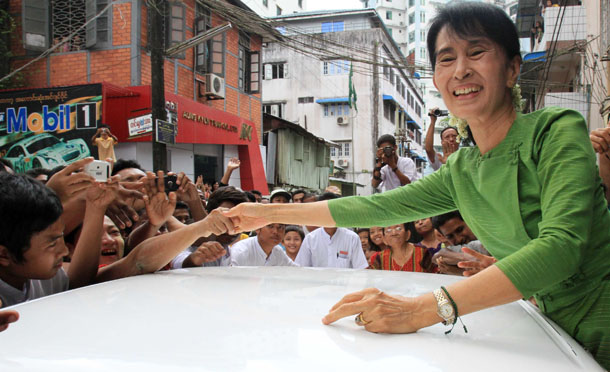RANGOON — Burma is preparing to host a high-level international women’s forum, with democracy icon Aung San Suu Kyi set to attend along with International Monetary Fund managing director Christine Lagarde and other prominent leaders.
The two-day Women’s Forum for the Economy and Society, organized in part by the French Embassy with support from the Burma government, is set to begin on Friday in Rangoon. Participants will examine a number of social and economic issues from women’s perspectives as Burma continues to transition from military dictatorship toward a more democratic system.
The event is expected to draw over 400 Burmese and international participants, including high-profile leaders from government, politics, business and civil society, according to organizers.
“In a society like Myanmar [Burma], where every kind of parameter from health and education to electricity and telecoms is poised for a blaze of change, women’s creativity and resilience will be vital to carry through successful transformation,” Véronique Morali, president of the Women’s Forum for the Economy and Society, said in a statement. “No sustainable social change is possible without the inclusion of women’s voices.”
Based in Paris and founded in 2005, the Women’s Forum is a subsidiary of Publicis Groupe, a French multinational advertising and public relations company. A global Women’s Forum meeting is held annually in France, while smaller forums are organized in other countries, with an event planned for Brazil next year and hopes to establish a forum in the Middle East.
Topics on the agenda in Rangoon will include responsible investment, as Burma attempts to attract foreign investors after decades of international isolation, as well as the role of women in peacebuilding, while the government seeks to consolidate ceasefires and end long-running insurgencies in border states. Discussions will also focus on challenges in reforming the country’s health care sector and education system, and efforts to promote freedom of expression as the government loosens its grip over the media.
Burmese Minister of Social Welfare Myat Myat Ohn Khin will be in attendance, along with French Minister of Culture and Communication Aurélie Filippetti.
Other prominent Burmese participants will include Aung Tun Thet, a member of President Thein Sein’s National Economic and Social Advisory Council and the Myanmar Investment Commission; Khin San Yee, deputy minister of national planning and economic development; and Thein Thein Htay, deputy minister of health. Lawmakers, government officials and activists from Cambodia, Nepal, the Philippines and Bangladesh will also attend, as well business leaders including Christophe de Margerie, chief executive of French oil and gas giant Total.
Earlier this year, Burmese activists called for greater legal protections during another women’s forum in Rangoon. The Myanmar Women’s Forum in September was a lower profile event internationally but historic for Burma, as it was the first women’s forum in the country to be organized in cooperation from ethnic minority women both inside and outside the country.
In October the Burma government launched a national strategic plan to empower women, suggesting practical ways to address challenges over the next decade in a dozen priority areas, including initiatives to improve access to education and health care as well as the development of better laws to eliminate gender-based violence.
Despite the international reputation of Suu Kyi, who rose to prominence as a leader of Burma’s struggle against military rule, few women have won seats in the country’s Parliament. About 95 percent of lawmakers are male, and women in the country continue to face major barriers to employment, education and health care.















